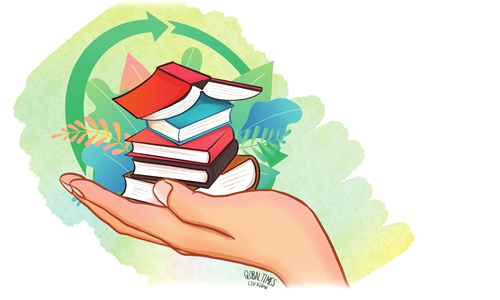ARTS / BOOKS
Too low to bear, not too late to care

Illustration: Liu Xidan/GT
Recently, an e-commerce platform launched a book promotion plan for the June 18 Chinese Shopping Festival, claiming to offer a 70-80 percent discount for all types of books for eight days. Subsequently, two joint statements issued by the publishing industry went viral on social media platforms. As of now, 56 publishing houses have declared that they will not participate in the promotion plan or bear any rebate costs incurred during the event. This is the largest collective boycott against an e-commerce platform by China's publishing industry over the years.
The publishing houses argue that when a book discount drops below 30 percent, they cannot cover the cost and will suffer losses. However, many consumers do not buy this opinion. They say that quite a few books are already priced too high, especially those of poor quality. They also say publishing houses have no grounds to blame distribution channels, while e-commerce platforms claim they hope to capitalize on a small profit but quick turnover strategy during the shopping festival.
To a certain degree, there is a conflict of interest between publishing institutions and e-commerce platforms despite their interdependence. The rise of e-commerce has changed consumer spending habits. Discounts attract attention but also reduce the profit margins of publishing houses. Gradually, different platforms and sales channels end up in price wars. With online book sales accounting for up to 80 percent of the book industry market share, e-commerce platforms frequently adopt a "price war" strategy to attract consumers. However, publishing houses that bear the cost must raise book prices to maintain profit. This has led to the actual value of books becoming distorted and offline purchasing channels gradually being pushed out of the competition.
This conflict between e-commerce platforms, publishers, and readers seems to stem from traditional industries' inability to adapt to the online market.
The challenges the book industry is currently facing go far beyond this. AI's arrival and widespread application has already impacted the industry. While it can accurately recommend books to readers and improve their reading satisfaction by analyzing their reading preferences, it has also started playing a role in content production, assisting in data analysis, proofreading, and even creation. In the long run, with the continuous progress of technology, AI's ability to produce content will only grow stronger, thereby threatening the content production of publishing houses.
Moreover, AI's interactive and learning abilities enable it to assist or even partially replace human jobs when it comes to digital products such as audiobooks and immersive reading. For example, through automatic speech recognition systems and speech synthesis technology, AI can read books out loud and help visually impaired individuals enjoy works. With the popularization of video generation technology, the short video field may experience an explosive expansion, leading to a further decrease in paper book readers. For publishers, this means competition in the traditional book market intensifies, and sales may be impacted.
Books are commodities that bear culture, knowledge, and emotions, making it difficult for us to overlook their significance in human spiritual civilization. In the era of the internet, how should publishers and platforms operate to ensure the healthy, orderly, and high-quality development of the industry? How should the interests of readers and publishers be balanced?
First, the quality of books must be improved. Publishers should focus on publications' intrinsic value, which will win readers' favor and maintain their competitive edge even during price wars. For example, university publishing houses can leverage their academic advantages.
Second comes the development of differentiation strategies. Publishers could adopt elastic differentiated pricing strategies. For instance, they can strategize different approaches for popular books and professional ones featuring unique academic value.
Third is building customer loyalty. Publishing houses can establish a membership system to provide exclusive discounts and value-added services to enhance customer loyalty.
E-commerce platforms can collaborate with publishing houses and industry associations to develop or guide book pricing strategies, ensuring book prices fluctuate within a reasonable range, avoiding malicious price wars, and maintaining industry interests and market order according to the law. In addition, they should strengthen copyright and quality supervision to safeguard consumer interests and the reputation of the publishing industry.
We need books that inherit culture and civilization. To this end, the publishing industry urgently needs to create a virtuous cycle in today's traffic-oriented market.
The author is a faculty member with the School of Applied Economics, Renmin University of China.



